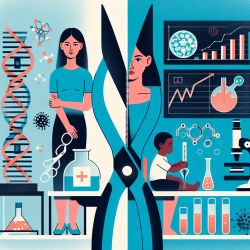Introduction
The He Jiankui affair, involving the first gene-edited babies, has stirred significant debate in the scientific community, raising ethical, legal, and procedural concerns. While the controversy primarily revolves around genetics, it offers valuable lessons for practitioners in various fields, including speech-language pathology. This blog aims to explore how data-driven decisions and ethical considerations can enhance outcomes for children in speech-language pathology.
Data-Driven Decisions in Speech-Language Pathology
In speech-language pathology, data-driven decisions are crucial for developing effective interventions. The He Jiankui affair highlights the importance of basing decisions on robust data and comprehensive research. Practitioners should prioritize evidence-based practices, ensuring that interventions are supported by scientific data and have been thoroughly tested for safety and efficacy.
For instance, when developing a new therapy technique, practitioners should conduct rigorous trials and gather data on its effectiveness across diverse populations. This approach not only enhances the credibility of the intervention but also ensures that it meets the diverse needs of children with speech and language disorders.
Ethical Considerations in Research
The ethical breaches in the He Jiankui case serve as a reminder of the importance of ethical considerations in research and practice. Speech-language pathologists must adhere to ethical guidelines when conducting research or implementing new interventions. This includes obtaining informed consent, ensuring participant safety, and maintaining transparency throughout the research process.
Practitioners should engage in continuous ethical education, staying informed about the latest guidelines and best practices. By fostering an ethical research environment, speech-language pathologists can contribute to the development of interventions that are both effective and ethically sound.
Enhancing Outcomes for Children
The ultimate goal of speech-language pathology is to enhance outcomes for children. The He Jiankui affair underscores the importance of prioritizing the well-being of participants in any research or intervention. Practitioners should focus on interventions that have been proven to benefit children, avoiding untested or potentially harmful techniques.
Collaboration with other professionals, such as educators and psychologists, can also enhance outcomes. By working together, practitioners can develop comprehensive intervention plans that address the holistic needs of children with speech and language disorders.
Encouraging Further Research
The He Jiankui affair has sparked a global conversation about the need for further research and regulation in gene editing. Similarly, speech-language pathologists should advocate for ongoing research to improve interventions and outcomes for children. Practitioners can contribute to research efforts by participating in studies, sharing data, and collaborating with researchers in related fields.
By supporting research initiatives, speech-language pathologists can help advance the field and ensure that interventions are based on the latest scientific evidence.
Conclusion
The He Jiankui affair offers valuable lessons for practitioners in speech-language pathology. By prioritizing data-driven decisions, adhering to ethical guidelines, and advocating for further research, practitioners can enhance outcomes for children with speech and language disorders. As the field continues to evolve, it is crucial to remain committed to evidence-based practices and ethical research.
To read the original research paper, please follow this link: CRISPR’d babies: human germline genome editing in the ‘He Jiankui affair’*.










